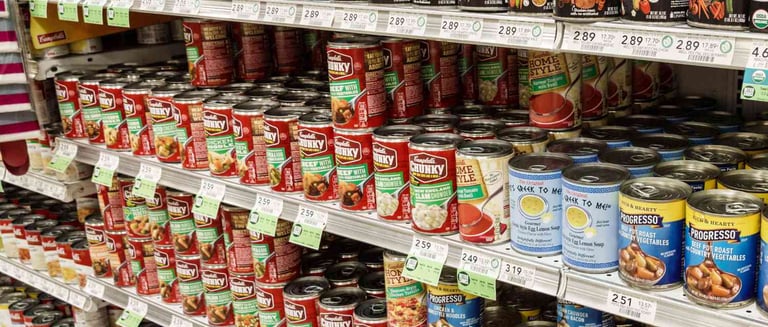10 Reasons Why Long-Term Food Storage is Essential
LONG-TERM FOOD STORAGE


10 Reasons Why Long-Term Food Storage is Essential
In a world full of uncertainties, preparing for the unexpected is a smart and practical choice. Whether it’s a natural disaster, economic downturn, or simply the unpredictability of everyday life, long-term food storage offers a reliable safety net for you and your family. It’s not just about having a stockpile of food—it’s about fostering security, self-reliance, and peace of mind.
This guide highlights 10 compelling reasons why long-term food storage is an essential part of any preparedness plan. From ensuring your family’s well-being during emergencies to promoting sustainable living and even saving money, the benefits are undeniable. If you’ve ever asked yourself, “Do I really need long-term food storage?” this article will provide the clarity you need to take the first step.
Discover how long-term food storage can empower you to face any challenge with confidence while safeguarding your family’s health, security, and future.
1. Emergency Preparedness
Natural disasters like hurricanes, earthquakes, or floods can disrupt food supply chains.
Events like these often result in empty grocery store shelves, power outages, and restricted access to essentials. A long-term food supply ensures that your family remains nourished and prepared even if relief efforts take time to arrive.In times of economic instability or job loss, having a stockpile of food ensures your family won’t go hungry.
Financial struggles, such as unemployment or inflation, can make regular grocery shopping difficult. A pre-stocked food supply offers stability during uncertain economic times and allows you to focus on regaining financial footing without compromising on basic needs.
2. Financial Savings
Buying food in bulk for storage often costs less per unit.
Purchasing staples like grains, beans, or canned goods in larger quantities is not only cost-effective but also reduces the number of trips to the store, saving time and fuel.Food storage helps you avoid paying inflated prices during shortages or emergencies.
During periods of high demand or supply chain disruptions, prices can skyrocket. By stocking up during sales or low-demand seasons, you avoid paying premium prices later.
3. Self-Sufficiency
Reduces reliance on grocery stores and external supply chains, especially during crises.
When stores close or shelves are empty, a well-stocked pantry ensures you have what you need without relying on external systems that might fail.Encourages a sense of independence and resilience for your household.
Knowing you can feed your family without outside help fosters confidence and self-reliance, especially during emergencies.
4. Convenience
Ready-to-use food simplifies meal prep during busy days or unexpected situations.
Pre-cooked or easily prepared items from your food storage can save time when you’re busy or exhausted, ensuring your family has nutritious meals without extra effort.It’s handy to have staples like rice, beans, and canned goods always available.
Long-term storage prevents last-minute grocery trips and ensures your kitchen is always stocked with the basics for quick, easy meals.
5. Food Security
Ensures a steady supply of nutritious food for your family regardless of external circumstances.
Food storage protects against sudden shortages, ensuring you have access to essential nutrients even when markets fail to meet demand.Minimizes stress during times when food access is uncertain.
Having a reliable supply means one less worry during turbulent times, allowing you to focus on other priorities.
6. Disaster Recovery
During prolonged emergencies, it may take time for supply chains to recover. Stored food can bridge the gap during the recovery period.
Disasters often cause lasting disruptions to transportation and production systems. Your stored food serves as a vital resource until systems normalize, keeping your family fed without reliance on uncertain external help.
7. Health and Nutrition
Enables you to store and consume healthier, home-preserved foods rather than relying on processed options during emergencies.
Home-canned fruits, vegetables, and meats offer a healthier alternative to many highly processed emergency rations.These canned and home-preserved foods can be used to supplement freeze-dried and dehydrated food.
Combining stored staples with specialty items ensures a balanced diet while maximizing variety and taste during extended emergencies.
8. Sustainability
Reduces food waste by storing excess seasonal or garden harvests for later use.
By preserving food from your garden or buying in-season produce in bulk, you can reduce waste and enjoy fresh, healthy options year-round.Encourages more sustainable living practices by planning for the future.
Long-term food storage promotes thoughtful consumption, reducing reliance on over-packaged, disposable food items.
9. Community Support
Stored food can be shared with friends, family, or neighbors in need during hard times, fostering community bonds.
In times of crisis, being able to help others by sharing your stored food strengthens relationships and creates a sense of mutual support within your community.
10. Peace of Mind
Knowing you are prepared provides emotional security and reduces anxiety about future uncertainties.
A well-stocked food supply allows you to sleep easier, knowing that no matter what happens, you can provide for your loved ones. It’s not just about survival—it’s about thriving with confidence during difficult times.
Long-term food storage is more than just an emergency plan—it’s a proactive step toward ensuring your family’s security, stability, and well-being in an uncertain world. By preparing in advance, you can face natural disasters, economic challenges, or unexpected life events with confidence and peace of mind.
From saving money and reducing food waste to fostering self-sufficiency and community support, the benefits of food storage extend far beyond simply having a stocked pantry. It’s about empowering your household to navigate any situation with resilience and preparedness while maintaining health, nutrition, and convenience.
Now is the time to take action. Start building your food storage today and invest in a safer, more secure future for your family. Continue with our guide that lays out detailed tips for starting and managing your long-term food storage.
Prepare, survive, thrive!
Recommended Article:
Tips for Starting and Managing Your Long-Term Food Storage